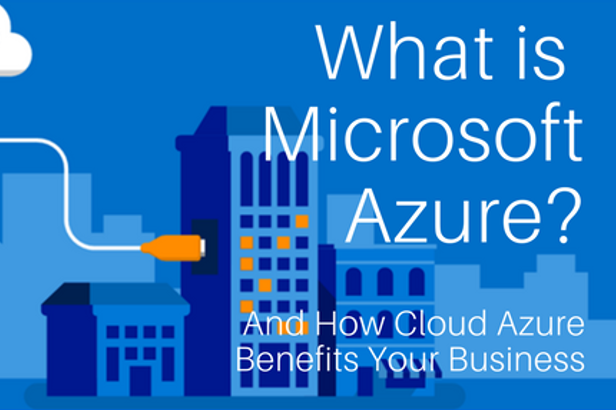Transitioning your business to cloud computing is not a simple matter of transferring your critical business data to a cloud storage service, like Dropbox.
After all, while such services can certainly provide the cloud storage for your data, they’re not the best option for keeping that data secure.
Simply storing your data on services also doesn’t enable your business to run computing processes or applications over the Internet, which is the definition of cloud computing.
To fully transition your business to a cloud computing model, you’ll therefore have to use the managed services of a cloud provider.
And while there are several choices of cloud providers in the market, the three biggest are Amazon Web Services (AWS), Microsoft Azure, and Google Cloud Platform (GCP) respectively.
Why Should You Choose Azure Over AWS As Your IaaS Platform? Here Are Three Key Reasons.
The services of the main three cloud providers have their specific strengths, and thus your choice of provider should depend on which of these services best fit your business’s particular needs.
Let’s look at the strengths of the cloud storage and cloud computing services that AWS, Azure, and GCP bring to the table.
The Unique Selling Points Of Each Cloud Provider
.png?width=1000&name=Figure_1_Magic_Quadrant_for_Cloud_Infrastructure_and_Platform_Services%20(1).png) Source: Gartner (2021)
Source: Gartner (2021)
AWS, Azure, and GCP are the recognised market leaders in the cloud computing sector.
.png?width=1000&name=AWS%20vs%20Azure%20vs%20GCP%20(1).png)
1. Amazon Web Services (AWS)
Thanks to its first-mover advantage and the dominant position it has in the market, AWS has been the market share leader in the Cloud Infrastructure as a Service (Cloud IaaS) market for more than a decade, according to Gartner’s Magic Quadrant for Cloud Infrastructure as a Service.
It’s also the most mature and enterprise-ready of the cloud computing services, with more than 18,000 distinct services including databases and storage solutions, and the largest network of data centres around the world.
2. Microsoft Azure
While it comes second to AWS in the cloud IaaS market, Microsoft Azure distinguishes itself from its biggest rival with its repurposing of on-premises Microsoft software – such as Windows Server, SQL Server, .NET etc. – to a cloud environment.
This means Azure is tightly integrated with all products in the Microsoft ecosystem, and also makes it the most compatible service among the three with hybrid cloud deployments.
Because of the above two factors, Azure is a solid choice for businesses that already rely on other Microsoft products, and/or would prefer to transition to a hybrid cloud model.
Want To Know More About Microsoft Azure And How It Can Benefit Your Business? Click Here.
3. Google Cloud Platform (GCP)
The youngest of the three cloud computing services, GCP is best suited for cloud-native businesses such as FinTech firms, as it was originally designed to support Google’s own products such as its titular search engine, and YouTube.
GCP presents a strong offering when it comes to containers, because Google developed the Kubernetes standard which is currently offered by AWS and Azure as well. It also has a strong emphasis on high compute offerings such as data privacy, Big Data analytics, artificial intelligence (AI) and machine learning (ML).
Availability Zones And Uptime
%20(1).jpg?width=1000&name=shutterstock_595172801%20(1)%20(1).jpg)
All of the three big cloud providers host the data centres on which they run their cloud services in locations all over the world.
These data centres are grouped into availability zones, a group of isolated data centres within a geographical region.
For the three cloud providers, availability zones are key to ensuring high availability of services even in the event of a failure at any point in their cloud infrastructure, and enabling them to meet service level agreements (SLAs) nonetheless.
It also enables their customers to store their business data in the location closest to their business, and access it with the lowest possible latency; a crucial factor in enabling smooth business operations in the cloud.
As the most established of the cloud providers, it’s no surprise that AWS has the largest worldwide coverage, with 81 availability zones across 25 regions around the world.
But Microsoft has invested greatly in the global reach of Azure, with 54 regions available in 140 countries at last count, and committing to launching availability zones in every country where Microsoft operates a data centre region by the end of 2021.
Not to be outdone by its bigger competition, GCP currently offers 85 availability zones across 28 regions.
It’s to be noted that all three cloud providers have data centres located in Singapore. Therefore, you can’t go wrong choosing any of them for your cloud computing needs, as your business will enjoy low latency with any of their services, as well as high availability when it comes to accessing your business’s critical data.
Data Security

Of course, data security is another critical consideration when it comes to choosing a cloud provider for your business’s transition to cloud computing. With cybersecurity threats proliferating in recent years, you’ll want to be sure your vendor can safeguard your data from malicious actors.
According to Rich Mogull – security professional with twenty years of experience in information security, physical security and risk management – AWS handles data security by isolating its many services from each other – meaning they can’t automatically access each other, unless you enable access.
This gives you a lot of control over the security configurations in your AWS instance, but does make enterprise-scale management – such as collecting security data and managing across regions – more difficult than necessary.
On the other hand, Microsoft Azure centralises security management by using the Azure Active Directory (AD) as the single source of truth for authorisation and permissions management.
While this makes security management more user-friendly and consistent, Azure environments are also less isolated and protected from each other than with AWS environments.
Lastly, GCP uses full-scale encryption of all data at rest and in transit, as well as the traffic between its data centres, to ensure data security when customers are performing business operations.
GCP also features a Cloud Security Command Centre, which is its version of the Azure Security Centre and the AWS Security Hub.
However, one downside with GCP is that there are relatively fewer security experts with deep experience in GCP, as well as a less robust community and tooling. This, of course, is to be expected with a cloud service younger than that of its nearest competitors.
Cloud Storage, Database, And Backup

As we mentioned earlier, transitioning your business to the cloud is not a mere matter of transferring your business data to cloud storage.
To truly enable cloud computing in your business, you need not just the cloud storage, but also the cloud database and backup services to run processes or applications over the cloud.
Let’s take a look at some of the services that the three big cloud providers offer;
Cloud Storage
%20(1).png?width=1000&name=AWS%20vs%20Azure%20vs%20GCP%20(2)%20(1).png)
AWS offers a range of cloud storage services, from its Simple Storage Service (S3) for object storage, Elastic Block Storage (EBS) for persistent file storage, and Elastic File System (EFS) for block storage.
Amazon also enables a hybrid storage environment with the Storage Gateway, and in cases where transfer of large volumes of data over the Internet isn’t feasible, the Snowball physical hardware device allows you to transfer and transport petabytes of data manually.
The storage services of Azure include Blob storage for REST-based object storage of unstructured data, Queue Storage for large-volume workloads, as well as File Storage and Disk Storage.
Azure also comes with a Data Lake Store, which is useful if your business has a need to run big data applications on a regular basis.
As for GCP, it provides a unified object storage service named Cloud Storage, along with a Persistent Disk option.
In addition, it also offers a Transfer Appliance which serves the same function as AWS’s Snowball, along with online data transfer services.
Cloud Database
%20(1).png?width=1000&name=AWS%20vs%20Azure%20vs%20GCP%20(3)%20(1).png)
When it comes to archiving data, AWS offers an SQL-compatible database called Aurora, as well as the Relational Database Service (RDS), a NoSQL Database called DynamoDB, an in-memory data store called ElastiCache, the Redshift data warehouse, Neptune graph database, and a Database Migration Service
But Azure has AWS beat with its extensive database options. It has three SQL-based options;
- SQL Database
- Database for MySQL
- Database for PostgreSQL
Azure also has Cosmos DB and Table Storage for NoSQL needs, a Data Warehouse service, and an in-memory cache service called Redis Cache.
For customers requiring a hybrid option, Azure also offers the Server Stretch Database as its hybrid storage service, which is designed for businesses which are currently using Microsoft SQL Server in their on-premise data centres.
Finally, GCP has a relatively sparse offering; it offers the SQL-based Cloud SQL service, and the Cloud Spanner relational database for mission-critical workloads. As for NoSQL options, it has the Cloud BigTable and Cloud Datastore services.
Cloud Backup
%20(1).png?width=1000&name=AWS%20vs%20Azure%20vs%20GCP%20(4)%20(1).png)
Finally, when it comes to cloud backup services, Microsoft Azure distinguishes itself from the other two services by being the only one that offers actual backup services. On top of that, it also offers a Site Recovery service, as well as an Archive Storage service.
This contrasts it with AWS – which offers Glacier as a long-term archival storage, but otherwise users have to set up Storage Gateway for backup and archive processes – and with GCP, which does not offer cloud backup services at all.
Choosing The Right Platform For Cloud Storage Depends On Your Business Needs

Ultimately, the choice of cloud provider depends on the unique needs of your business, and how well the respective strengths of their respective cloud platforms fit those needs.
AWS is suitable for large enterprises which need a wide range of cloud services, and have the capacity to handle the complexity that comes with using such an established cloud service.
That said, if your business is already using many Microsoft products, Azure’s ability to integrate easily with them might make it the obvious choice for your business, especially if you really need robust cloud backup options along with it.
Finally, although GCP has a smaller selection of cloud services than either AWS or Azure, they may be suitable for businesses which operate in a cloud native environment.
Having read through our comparison of the three big cloud providers when it comes to their cloud storage, database and backup offerings, are you leaning towards Azure as potentially being the best choice for your business?
If so, we can tell you more about how Microsoft’s cloud computing platform could benefit your business. Click on the image below to learn more.




